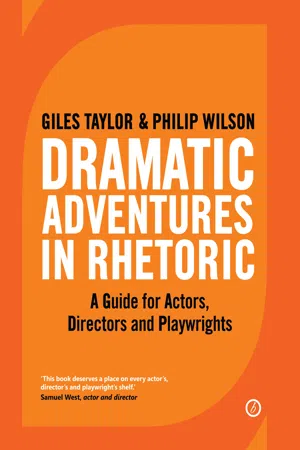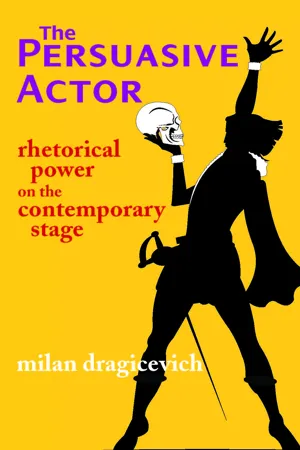Literature
Antithesis
Antithesis is a literary device that involves the juxtaposition of contrasting ideas, words, or phrases within a parallel grammatical structure. It is used to create a sense of balance and emphasis, often highlighting the differences between two concepts. In literature, antithesis can add depth and complexity to the meaning of a text by drawing attention to the contrast between opposing elements.
Written by Perlego with AI-assistance
Related key terms
1 of 5
3 Key excerpts on "Antithesis"
- eBook - ePub
Dramatic Adventures in Rhetoric
A Guide for Actors, Directors and Playwrights
- Giles Taylor, Philip Wilson(Authors)
- 2015(Publication Date)
- Oberon Books(Publisher)
You can have Antithesis of Characters: endless stories have goodies and baddies of some sort, and think of the good and evil angels in Marlowe’s Doctor Faustus. You can also have the Antithesis of Time: think of plays that are set in both the past and the present, like J.B. Priestley’s Time Plays. You can have an Antithesis of Setting: Shakespeare’s The Winter’s Tale is a case in point, with the Antithesis between the brooding, emotionally stultified kingdom of Sicilia, in opposition to the light, playful world of Bohemia. In Renaissance drama, it is common to have a rich Antithesis of Thematic Imagery. In no play is it more apparent than in Shakespeare’s Romeo and Juliet (1595), in which the over-riding themes of black and white, day and night, and dark and light are verbal echoes of the opposition between the Capulets and Montagues. Here is Romeo when he first sets eyes on Juliet: ROMEO : O, she doth teach the torches to burn bright! It seems she hangs upon the cheek of night As a rich jewel in a Ethiop’s ear – Beauty too rich for use, for earth too dear! So shows a snowy dove trooping with crows As yonder lady o’er her fellows shows. Antithesis is very often pointed up by combining with rhetorical devices from the acoustic family (see Chapter 2). ALLITERATIVE Antithesis This is when ALLITERATION is used to point up the words in opposition to each other. Many classic examples have become well established: ‘heaven or hell’, ‘virtue or vice’, ‘friend or foe’, ‘love or loathe’, ‘pleasure or pain’, ‘make or mar’, ‘hurt or heal’, ‘boom or bust’, ‘help or hinder’, and ‘like it or lump it’ to name a few. There is often a self-satisfied quality to characters who use this device. Consider Mrs Levi in Thornton Wilder’s The Matchmaker (1954), who says that money is ‘like the sun we walk under; it can kill or cure’. The Judge in Reginald Rose’s Twelve Angry Men (1956) informs the jury that it is their ‘duty to try and separate the facts from the fancy’ - eBook - PDF
The Rhetorical Fabric of the Traditional Arabic Qasida in Its Formative Stages
A Comparative Study of the Rhetoric in Two Traditional Poems by 'Alqama l-Fahl and Bashshar b. Burd
- Ali Ahmad Hussein(Author)
- 2018(Publication Date)
- Harrassowitz Verlag(Publisher)
In the camel-section, the Antithesis is used marginally, and it describes the continuous trip of the camel. In most the cases of the Antithesis, Bashsh4r does not mention arbitrary words that simply have two contradictory meanings (to exclude the case in §218). Rather, he attempts to give the audience some signs which makes them aware of the Antithesis. Here, the two parts of the Antithesis are highlighted by one of the following means: (1) by making a metaphorical, or metonymical, use of the Antithesis (mainly §219, 223, 225); (2) by positioning the Antithesis in significant places in the verse; such as using the tardıd , a type of Antithesis that includes a relation of “echoing” (§219, 222); or by juxtaposing the two parts without making any separation between them (§221, 223, 224); or by making one of the two parts, or even the two parts, either opening, or closing, or opening and closing the hemistich or the verse (§215, 216, 217, 220, 225 ); (3) the third way is by repeating one part, or the two parts, of the Antithesis (§215, 227); (4) a unique form of the Antithesis can be seen in §226, where it includes a tawriya . The antitheses by Bashsh4r tend to include a verbal element: either a verb or a participle. The noun plays a marginal role in this rhetorical figure. Using the verbal element contributes a vividness and motion in the text. It produces mobile images and incidents; this is in contrast to the noun Antithesis which normally produces a static image. The antitheses are composed of the following: (1) two participles (§215, 221); (2) a participle vs. a verb (§218); (3) a participle vs. an infinitive (§222); (4) two verbal sentences (§216, 225, 227); (5) a verbal sentence vs. a sentence starting with a participle (§219); (6) a noun vs. a verbal sentence or vs. a sentence that starts with a participle (§224; 226). Only in rare cases does the Antithesis include two nouns (§220, 223). - eBook - ePub
The Persuasive Actor
Rhetorical Power on the Contemporary Stage
- Milan Dragicevich(Author)
- 2019(Publication Date)
- Focus(Publisher)
Good luck making sense of that interpretation. Personal pronouns are not operative here, nor are words like “afeard” or “same.” They can smother the Antithesis with ill-informed stress and accents. Emphasizing them distracts the ear. It is therefore crucial to track down or highlight only the operative phrases—the key words that feature antithetical stretch. Therein lies the very power of rhetorical balance.Remember, the alternative to stretching the text is the dull gray middle where all words are equally bland .No stretch. No balance. The two ends sit in the lifeless middle. “Act and valor” sound just like “desire.” No way to tell them apart. The imaginary “string” between them sits limp and contracted, incapable of sound. There is {6} no persuasive reason that Macbeth, or the audience, should be affected by the contrast. Much of contemporary American culture celebrates a kind of monotone speaking, as it conveys a cool persona, one unfazed by the daily exigencies of life. Coolness is somehow equated with the total absence of vocal exertion, since the person is too cool, apparently, to expend the uncool energy necessary to make melodramatic verbal distinctions. The magical verbal exuberance of the child years drains away and gets replaced by the jaded vocal reluctance of the young adult years.This attitude has a profound impact on contemporary actor training. Young actors come to believe that anything outside the narrow naturalistic box is overacting. It’s phony. Not believable. So they take language brimming with exciting possibilities and flatten it into a numbing sameness. Let’s break open this box and look at some more examples of how antithetical stretch works.Double Antithesis
No playwright loved rhetorical balance more than George Bernard Shaw, whose contrarian view of the world prompted him to set radical ideas against conventional ones. In Major Barbara , a play that pits practical worldly power against spiritual power, the munitions maker Andrew Undershaft delivers a sermon on how the sword is mightier than the pen.Vote! Bah! When you vote, you only change the names of the cabinet. When you shoot, you pull down governments, inaugurate new epochs, abolish old orders and set up new.
Index pages curate the most relevant extracts from our library of academic textbooks. They’ve been created using an in-house natural language model (NLM), each adding context and meaning to key research topics.


